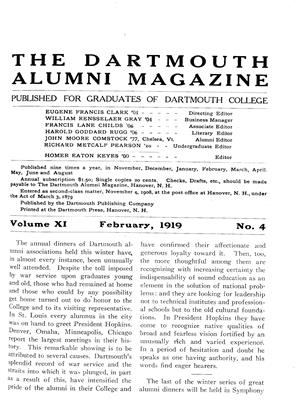At a meeting of the Boston School Committee on January 20 Mr. Frank V. Thompson, Superintendent of the Boston Public Schools, arraigned the colleges of New England, and Harvard, Dartmouth, and Amherst, in particular, for setting standards so high as to exclude the average high school graduate from entrance. Mr. Thompson's statement aroused much discussion in the papers of New England and called forth replies from representatives of the institutions attacked.
The statement issued to the press by President Hopkins in this connection is as follows:
"Discussion has been aroused in regard to the entrance requirements of Dartmouth College by the reported statement of Superintendent Thompson, of the Boston public school system, that certain colleges, among which was Dartmouth, were not fulfilling their obligations to society in that they had established entrance requirements so high that it was impossible for the public school system of the country to articulate with these.
"I stated over the telephone in response to inquiry from one of the Boston papers that I was thoroughly in sympathy with the importance which Mr. Thompson attached to the desirability that colleges of the first rank should not make themselves inaccessible to the respective public school systems of the various states; and, furthermore, that I believed that the college undergraduate body at any time ought in its sources to represent a cross section of the social state.
"I did not undertake to dispute Mr. Thompson's statement as reported, for I feel certain that he has not been reported entirely correctly in the matter of the impossibility of men preparing for Dartmouth in the usual high schools of good rank.
"The undergraduate constituency of Dartmouth represents an exceedingly wide geographical area, and in its proportions is most unusual in that fifty per cent of the College comes from outside New England. The College is not fed from any single great preparatory school, nor from any group of these, but draws alike from the public school systems and the private schools of the whole country.
"Examination shows that year in and year out from two-thirds to three-quarters of the men enrolled here are prepared for college in regular course in the high schools.
"I would in no way attempt to argue that the College has found an ideal basis of admission. It may well be that great improvements can be made. But the system as it exists is the result of the most painstaking sort of investigations year in and year out by capable committees of the faculty. The attempt constantly has been to keep the system as flexible as possible under the limitation always that we should safeguard the two points: that men admitted to College should be of intellectual capacity to do good work in subjects of college grade on the one hand; while on the other hand we should insure that the men had received sufficient grounding in those secondary school subjects which of necessity are prerequisites of college work.
"There is one additional factor that must be considered, namely, that colleges such as those named by Mr. Thompson are only equipped to handle a limited number, and that there must be some sort of a qualitative test by which a college may restrict the privilege of becoming candidates for its degree. I heartily endorse Mr. Thompson's contention as I understand it, that the colleges should not break with the public school system ; but this does not necessarily mean that a man should be permitted to enter college from any high school, nor even that every man should be accepted from even the best schools unless all alike have shown ability to do work of superior quality.
"In short, Dartmouth stands for the principle that it wishes to be accessible to men from all classes in society, from all parts of the country, and from all schools, private or public, which are utilizing the time of their students to advantage.
"In view of the fact that the student body at Dartmouth represents a wide social and geographical area, comes in large proportions from the public schools, and does not average in age higher than men at other colleges, I believe that we are meeting the issue which Mr. Thompson raised."
 View Full Issue
View Full Issue
More From This Issue
-
 Article
ArticleMILITARY NEWS
February 1919 -
 Article
ArticleTHE STUDENTS' ARMY TRAINING CORPS OF 1918
February 1919 By Edwin J. Bartlett '72 -
 Article
ArticleThe annual dinners of Dartmouth
February 1919 -
 Article
ArticleDARTMOUTH ROLL OF HONOR
February 1919 -
 Article
ArticleDARTMOUTH REUNION IN PARIS
February 1919 -
 Class Notes
Class NotesCLASS OF 1916
February 1919 By Richard Parkhurst








